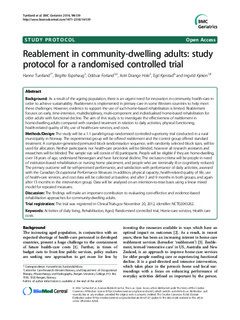| dc.contributor.author | Tuntland, H. | |
| dc.contributor.author | Espehaug, Birgitte | |
| dc.contributor.author | Førland, Oddvar | |
| dc.contributor.author | Hole, A.D. | |
| dc.contributor.author | Kjerstad, E. | |
| dc.contributor.author | Kjeken, I. | |
| dc.date.accessioned | 2017-06-07T12:37:52Z | |
| dc.date.available | 2017-06-07T12:37:52Z | |
| dc.date.issued | 2014 | |
| dc.identifier.citation | Tuntland, H., Espehaug, B., Forland, O., Hole, A.D., Kjerstad, E. & Kjeken, I. (2014) Reablement in community-dwelling adults: study protocol for a randomised controlled trial. BMC Geriatr., 14, s. 139. | |
| dc.identifier.uri | http://hdl.handle.net/11250/2444976 | |
| dc.description | Studieprotokoll (plan) for den første norske effektstudien (RCT) av hverdagsrehabilitering. | |
| dc.description.abstract | Abstract Background: as a result of the ageing population, there is an urgent need for innovation in community health-care in order to achieve sustainability. Reablement is implemented in primary care in some Western countries to help meet these challenges. However, evidence to support the use of such home-based rehabilitation is limited. Reablement focuses on early, time-intensive, multidisciplinary, multi-component and individualised home-based rehabilitation for older adults with functional decline. The aim of this study is to investigate the effectiveness of reablement in home-dwelling adults compared with standard treatment in relation to daily activities, physical functioning, health-related quality of life, use of health-care services, and costs. Methods/Design: the study will be a 1:1 parallel-group randomised controlled superiority trial conducted in a rural municipality in Norway. The experimental group will be offered reablement and the control group offered standard treatment. A computer-generated permuted block randomisation sequence, with randomly selected block sizes, will be used for allocation. Neither participants nor health-care providers will be blinded, however all research assistants and researchers will be blinded. The sample size will consist of 60 participants. People will be eligible if they are home-dwelling, over 18 years of age, understand Norwegian and have functional decline. The exclusion criteria will be people in need of institution-based rehabilitation or nursing home placement, and people who are terminally ill or cognitively reduced. The primary outcome will be self-perceived performance, and satisfaction with performance of daily activities, assessed with the Canadian Occupational Performance Measure. In addition, physical capacity, health-related quality of life, use of health-care services, and cost data will be collected at baseline, and after 3 and 9 months in both groups, and again after 15 months in the intervention group. Data will be analysed on an intention-to-treat basis using a linear mixed model for repeated measures. Discussion: the findings will make an important contribution to evaluating cost-effective and evidence-based rehabilitation approaches for community-dwelling adults. Trial registration: the trial was registered in ClinicalTrials.gov November 20, 2012, identifier: NCT02043262. Keywords: Activities of daily living, Rehabilitation, Aged, Randomised controlled trial, Home-care services, Health care costs. | |
| dc.language.iso | eng | |
| dc.rights | Navngivelse 4.0 Internasjonal | |
| dc.rights.uri | http://creativecommons.org/licenses/by/4.0/deed.no | |
| dc.subject | hverdagsrehabilitering | |
| dc.subject | Activities of daily living (ADL) | |
| dc.subject | rehabilitation | |
| dc.subject | aged | |
| dc.subject | randomised controlled trial | |
| dc.subject | home care services | |
| dc.subject | health care costs | |
| dc.title | Reablement in community-dwelling adults: study protocol for a randomised controlled trial | |
| dc.type | Journal article | |
| dc.type | Peer reviewed | |
| dc.source.journal | BMC Geriatrics | |
| dc.identifier.doi | https://doi.org/10.1186/1471-2318-14-139 | |

